Lilies of the Field Blu-ray Movie
HomeLilies of the Field Blu-ray Movie 
Kino Lorber | 1963 | 94 min | Not rated | Aug 10, 2021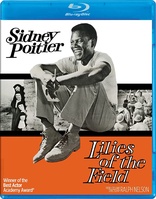
Movie rating
7.4 | / 10 |
Blu-ray rating
| Users | 0.0 | |
| Reviewer | 3.5 | |
| Overall | 3.5 |
Overview
Lilies of the Field (1963)
A traveling handyman becomes the answer to the prayers of nuns who wish to build a chapel in the desert.
Starring: Sidney Poitier, Lilia Skala, Francesca Jarvis, Stanley Adams, Dan FrazerDirector: Ralph Nelson
| Drama | Insignificant |
| Comedy | Insignificant |
Specifications
Video
Video codec: MPEG-4 AVC
Video resolution: 1080p
Aspect ratio: 1.66:1
Original aspect ratio: 1.85:1
Audio
English: DTS-HD Master Audio 2.0 Mono (48kHz, 16-bit)
Subtitles
English
Discs
Blu-ray Disc
Single disc (1 BD)
Playback
Region A (B, C untested)
Review
Rating summary
| Movie | 3.5 | |
| Video | 4.0 | |
| Audio | 4.5 | |
| Extras | 1.5 | |
| Overall | 3.5 |
Lilies of the Field Blu-ray Movie Review
Reviewed by Dr. Stephen Larson July 23, 2023Ralph Nelson's LILIES OF THE FIELD (1963) remains in print courtesy of Kino Lorber. The BD-50 has essentially replaced the out-of-print 2016 disc from Twilight Time. Kino includes an exclusive audio commentary. In English, with optional English subtitles for the main feature. Region "A" locked.
In his 1980 autobiography, This Life, Sidney Poitier recalls that William Barrett's 92-page novelette, The Lilies of the Field (1962), was first brought to the attention of theatrical agent Fred Ingels, who deemed it ideal material to adopt into a film. With the support of director Ralph Nelson and "strong assistance" from Martin Baum (later a film producer), they helped realize it to the silver screen. Poitier also recounts the financial hurdles it took to get Lilies of the Field made. Ingels had quit the agency he was affiliated with and went to work for Baum, who already had Nelson as a client and brought him with. Poitier claims that United Artists Corp. demonstrated "very little faith" in Lilies of the Field. The studio only offered Nelson and Ingels $250,000 for the whole production. UA stipulated that if Nelson had any difficulty finishing the film with the allocated budget, he would be held personally accountable for all overages incurred. Nelson put his house and other assets on the line as collateral to insure UA against loss. Nelson couldn't afford to pay Poitier his usual salary. But, according to the press kit, because Poitier was so exuberant about portraying Homer Smith in the movie, the young star cut his usual fee by two-thirds and agreed to a share of the box-office profits. Lilies of the Field was filmed in Tucson, Arizona, mainly on a derelict farm outside the city limits. As Julie Kirgo points out in the Twilight Time audio commentary and in her liner notes for that disc, the land was reportedly owned by Linda Ronstadt's father. The press kit reports that since cast and crew only had fourteen days on location, production manager J. Paul Popkin hired workmen on 24-hour shifts to assist in building the chapel while keeping pace with the film shoot.
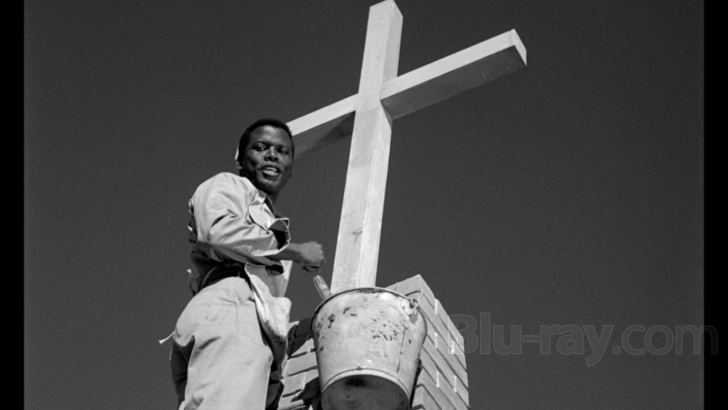
"This part is mine."
While deserving of its repute as a classic, Lilies of the Field (1963) has two weaknesses that stem from James Poe's script. When Homer (Sidney Poitier) arrives at the residence of five East German Catholic nuns, he agrees to help erect beams for the chapel that they want constructed. Homer explains to Mother Superior, Sister Maria (Lilia Skala), that "for hire" means he'll receive money for his work. Homer locates passages in his "Pocket Testament" to show that man should be compensated for his work. Sister Maria counters by quoting from a section in her oversized German Bible on non-materialism: "Consider the Lilies of the Field." The two have a clear difference of opinion on how and why the work should be carried out. It's Poe's fault that he doesn't make Homer more persistent in receiving at least some funds for continuing his work on the chapel. Homer neither pushes Sister Marie for money nor does he query any from the four other nuns: Sister Gertrude (Lisa Mann), Sister Agnes (Iso Crino), Sister Albertine (Francesca Jarvis), or Sister Elizabeth (Pamela Branch). Even though Homer performs construction work for contractor Harold Ashton (Ralph Nelson), it's only on a part-time basis. He must need additional income to earn a living. Poe mythologizes Homer as this angel sent by God to do the work his maker wants. The other issue I have is that the Mexican-Americans are marginalized in the story. Sure, this is 1963, but the filmmakers exploit Stanley Adams's character of Juan as a stereotypical "big fat Mexican." When Mr. Ashton comes to visit the unfinished chapel where Juan and other Mexican laborers are present, it plays out as if they're "carrying out work for the white man." Lilies of the Field is largely redeemed by Poitier's charismatic performance, which he road all the way to an Oscar.
Lilies of the Field Blu-ray Movie, Video Quality 
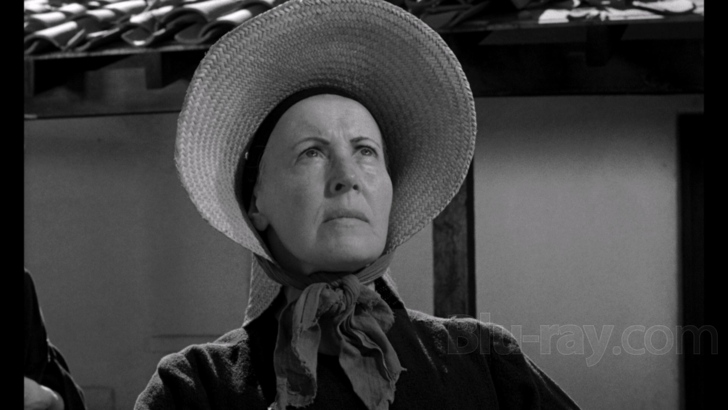
Kino Lorber Studio Classics' release of Lilies of the Field comes on a MPEG-4 AVC-encoded BD-50 (disc size: 33.18 GB). The film appears in its presumed theatrical exhibition ratio of 1.66:1. On this disc's commentary track, Sergio Mims touts this transfer as taken from a "brand new restoration." However, this is the same transfer that my colleague Jeff Kauffman reviewed seven years ago on the Twilight Time disc. From the defunct label's leaflet: "Blu-ray Authored and Mastered at Ambient Digital Media, Marina Del Rey, CA; Technical Services: Jeff Jewett." Grayscale is solid and black levels are deep. (Check out the nuns' garments in Screenshot #13.) Grain is fairly hefty at times. The grain pattern occasionally flickers near the top or towards the middle of the frame. I've built a graphical comparison between the two discs' transfers. The first instance of flickering that I noticed is the extreme long shot of Homer and the nuns outside the station wagon in Screenshot #s 20-21. You'll be able to spot unnatural mosquito grain in the sky while the nuns sidle down the country road in frame grabs 18-19. When the grain structure is unbalanced, digital noise is generally present. Kino has encoded the feature at a mean video bitrate of 38916 kbps. This is a very healthy standard bitrate. Twilight Time's video encode boasts an average bitrate of 29999 kbps.
Screenshot #s 1-15, 17, 19, 21, 23, & 25 = Kino Lorber 2021 BD-50
Screenshot #s 16, 18, 20, 22, & 24 = Twilight Time 2016 BD-50
Kino's disc contains about eight chapter breaks. The TT has three times as many.
Lilies of the Field Blu-ray Movie, Audio Quality 
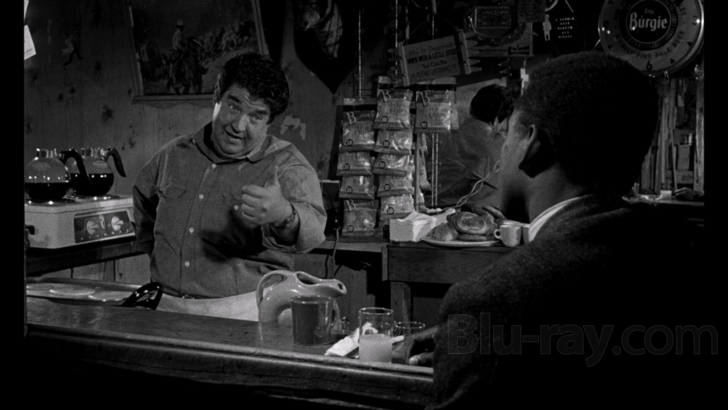
Kino has supplied a DTS-HD Master Audio Dual Mono mix (1557 kbps, 16-bit). Twilight Time's uncompressed mix is only one-channel mono (1030 kbps, 24-bit). There are no pops, crackles, dropouts, or clearly audible hiss. Spoken words are clear and understandable. Some of the dialogue has German and Spanish dialect, which hasn't been translated. (This seems to have been Nelson's intention.) The wider dispersal of monaural sound helps open up Jerry Goldsmith's Americana-flavored score. As Jeff Bond writes in the liner notes for Perseverance Records' soundtrack album, the score was primarily written for harmonica, banjo, and guitar. Goldsmith constructs instrumental cues out of the ballad "Amen," which was written and sung by Jester Hairston (who dubs for Poitier in the film). Goldsmith also incorporates a lovely trumpet on the album tracks "Homer's Return" and "Feed the Slaves" / "Drive to Mass." While the music is often reminiscent of Aaron Copland, Goldsmith stamps his own imprint on it.
Kino delivers optional English subtitles for the 94-minute feature.
Lilies of the Field Blu-ray Movie, Special Features and Extras 
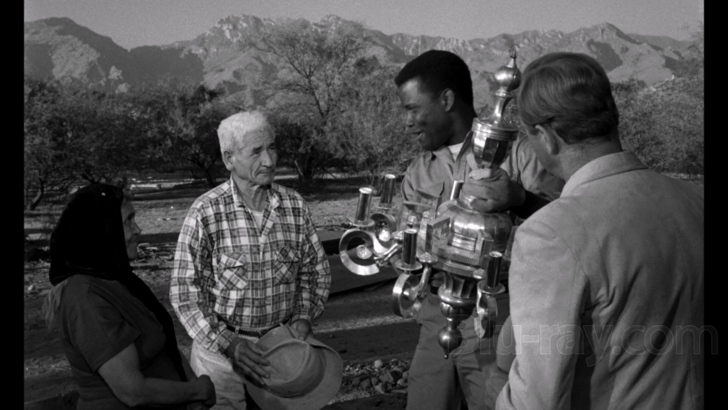
The Twilight Time disc has a commentary track with film historians Lem Dobbs, Julie Kirgo, and Nick Redman. I've listened to it twice and consider it a worthy complement to the commentary on this Kino disc. Dobbs read both the Barrett novelette and James Poe's published screenplay. He delves into any differences in dialogue that he noticed between the print texts and the finished film. The trio discuss Poitier's career and his on-screen persona at length. They also devote some attention to Goldsmith's score.
- NEW Audio Commentary by Sergio Mims - Mims seems to have been a substitute for film historian David Del Valle, who was originally scheduled to record a commentary for this disc. Recorded in 2021, this feature-length track with Mims starts out trivial and anecdotal. It gets better as the film progresses, however, when Mims begins discussing Poitier's career and the ladies cast as the nuns. Mims delivers an extended analysis of the "Magical Negro" construct and how it pertains to this film. In English, not subtitled.
- Theatrical Trailer (3:15, 1080p) - a post-festival original trailer for Lilies of the Field that appears in 1.66:1 anamorphic widescreen. This United Artists trailer hasn't been restored as it sports film artifacts and thin tramlines. Still, it's in decent shape to remain watchable.
- KLSC Trailers - bonus trailers for seven other Studio Classics titles.
Lilies of the Field Blu-ray Movie, Overall Score and Recommendation 
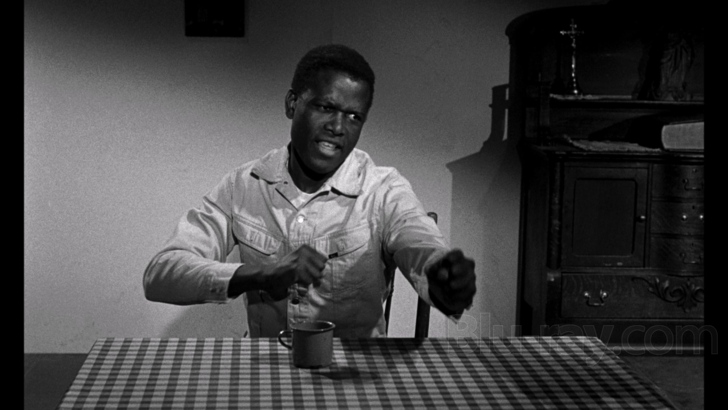
If you didn't snag Twilight Time's limited edition of Lilies of the Field, you'll want to grab this edition from Kino Lorber. It sports a superior video bitrate and also has a dual-channel mono mix. The feature-length audio commentary by Sergio Mims improves as it goes along. Kino retains the same 2K transfer as the TT. A future restoration should have better grain management. This older scan features mosquito noise that sometimes flickers. Still, this is a very good transfer that has minimal damage. A SOLID RECOMMENDATION.
Other editions
Lilies of the Field: Other Editions
Similar titles
Similar titles you might also like

The Hero
2017

The Hunting Party
1971

Save Your Legs!
Limited Edition to 3000
2012

Waiting for the Barbarians
2019

Almost an Angel
1990

The Electric Horseman
1979

Frontera
2014

There Was a Crooked Man...
Warner Archive Collection
1970

The Ballad of Cable Hogue
Warner Archive Collection
1970

Man of the East
E poi lo chiamarono il magnifico
1972

3 Godfathers
Warner Archive Collection
1948

Tell Them Willie Boy Is Here
1969

The Frisco Kid
Warner Archive Collection
1979

Gunless
2010

Broken Trail
2006

Jayne Mansfield's Car
2012

Northern Exposure: The Complete Series
1990-1995

Ride Lonesome 4K
1959

Convoy
1978

Rust Creek
2019
